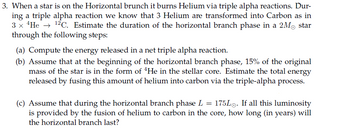3. When a star is on the Horizontal brunch it burns Helium via triple alpha reactions. During a triple alpha reaction we know that 3 Helium are transformed into Carbon as in $3 \times{ }^4 \mathrm{He} \rightarrow{ }^{12} \mathrm{C}$. Estimate the duration of the horizontal branch phase in a $2 M_{\odot}$ star through the following steps:
(a) Compute the energy released in a net triple alpha reaction.
(b) Assume that at the beginning of the horizontal branch phase, $15 \%$ of the original mass of the star is in the form of ${ }^4 \mathrm{He}$ in the stellar core. Estimate the total energy released by fusing this amount of helium into carbon via the triple-alpha process.
(c) Assume that during the horizontal branch phase $L=175 L_{\odot}$. If all this luminosity is provided by the fusion of helium to carbon in the core, how long (in years) will the horizontal branch last?

Step by stepSolved in 2 steps

- 6. If Nitrogen-14 absorbs an alpha particle and then emits a Hydrogen-1, what is the resulting nucleus? 7. If Au-185 emits an alpha particle, what is the nucleus formed? 8. What nucleus emits an alpha particle and forms Th-234?arrow_forwardQuestion A4 Calculate the mass (in kg) of 14C that has an activity of 1 Bq.arrow_forwardPlease help me with the following question and pls make sure its correct 100% its important, thanks Question: Answer the following question and be sure to review Example 30.4 before attempting these problems. Part A. A 11,460-year-old archeological specimen has a 14C activity of 6.5×10−2 Bq. What is the carbon mass of the specimen? Express your answer with the appropriate units. ( possible in grams) Part B . A 7.0×10−2 kg tumor is treated with a high-energy proton beam. If the equivalent dose delivered to the tumor is 1900 rem, how much energy did the tumor absorb? Express your answer with the appropriate units. ( in J)arrow_forward
- The Inverse Square Law: Oa. The x-ray beam is directly proportional to the square of distance from the source. Ob. The x-ray beam is directly proportional to half the distance from the source. Oc. The x-ray beam is inversely proportional to half the distance from the source. d. The x-ray beam is inversely proportional to the square of distance from the source.arrow_forwardCalculate the partial pressure of helium gas for a volume of 1.0 x 10-6 m3 of 22286Rn gas after 6 days. The radon gas was originally placed in an evacuated container at 1.0 atm, and the temperature remains constant at 0°C. What is the partial pressure of the radon gas after 6 days? (t1/2 = 3.82 d for 222Rn)arrow_forward